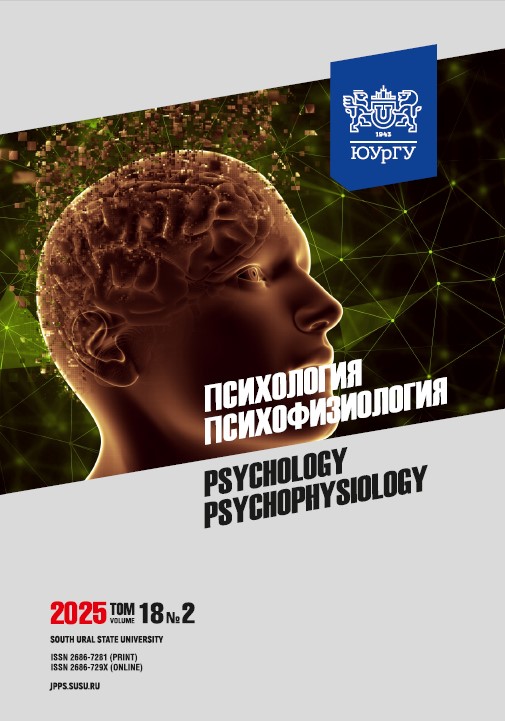The socio-psychological effects of science fiction film: the “Alien” image’s impact on personality
Abstract
Introduction. This study examines the influence of Ridley Scott’s science fiction film Blade Runner (1982) on individuals’ self-reflection. The visual image of the “Alien” in the film is conceptualized as a basis for re-evaluating and restructuring one’s self-concept. Aim – to study the effects on the personality of the science fiction film “Blade Runner”, which conveys the image of the “Alien”. Materials and methods. The study involved 62 first-, second-, and third-year university students from Chelyabinsk, including 32 psychology students and 30 economics students. The California Psychological Inventory (CPI) and the Personality Differential were employed to assess self-perception shifts. Results. Group-level analysis demonstrated changes in participants’ self-image perception following film exposure. These effects were mediated by socio-psychological characteristics: psychology students demonstrated increased perceived sociability and social engagement, whereas economics students reported increased conscientiousness, stubbornness, and irritability alongside reduced social focus. Key effects emerged from analyzing self-image dynamics: self-image expansion; self-image reduction; self-image re-evaluation; and self-image stabilization. Correlation analysis between self-perception and the “Alien” image perception demonstrated positive/negative identification effects across personality qualities and a “mirror symmetry” effect between verbal activity and moral self-assessment. Conclusion. The identified effects can be used in art therapy, personal development training, and social cognition interventions.
Downloads
References
2. Kurilenko V.B., Ershova R.V., Novikova I.A. Digital society as cultural-historical context of personality development. Vestnik Rossiiskogo universiteta druzhby narodov. Seriya: Psikhologiya i pedagogika = RUDN Journal of Psychology and Pedagogics. 2022;19(2):185–194. (in Russ.). DOI: 10.22363/2313-1683-2022-19-2-185-194.
3. Stoehr K.L. 2001: A Philosophical Odyssey. The Philosophy of Science Fiction Film. Ed. S.M. Sanders. The University Press of Kentucky. 2008:119–134.
4. Samutina N. Fantasticheskoe kino i problema inogo [Fantastic cinema and the problem of the other]. Fantasticheskoe kino. Epizod pervyi [Fantastic movie. Episode one]. Ed. N. Samutina. Moscow. Novoe literaturnoe obozrenie Publ. 2006:66–82. (in Russ.).
5. Haney W.S. Cyberculture, Cyborgs and Science Fiction. Consciousness and the Posthuman. Amsterdam. New York. NY. 2006:192.
6. Bandura A. Teoriya sotsialnogo naucheniya [The Theory of Social Learning]. St. Petersburg. Evraziya Publ. 2000:320. (in Russ.).
7. Petrenko V.F., Dedyukina E.A. The search for the meaning of ones own existence (based on the material of perception and understanding of a feature film). Vestnik Moskovskogo universiteta. Seriya 14: Psikhologiya = Bulletin of the Moscow University. Series 14 Psychology. 2018;4:54–73. (in Russ.). DOI: 10.11621/vsp.2018.04.54.
8. Gryazeva-Dobshinskaya V.G., Korobkova S.Yu., Dmitrieva Yu.A. Psychosemantics of the Character Attraction in the Cult Films and Symbolic Mythological Contexts of Subjects Identification. Кulturno-istoricheskaya psikhologiya = Cultural-Historical Psychology. 2023;19(4):14–25. (in Russ.). DOI: doi.org/10.17759/chp.2023190402
9. Yanovsky M.I. Impact of the Comedy on the Self-concept of the Viewer. Кulturno-istoricheskaya psikhologiya = Cultural-Historical Psychology. 2023;19(4):34–45. (in Russ.). DOI: 10.17759/chp.2023190404
10. Filippov A.F. Vosstanie karteziantsev: k sotsiologicheskoi kharakteristike filma Begushchii po lezviyu [The Uprising of the Cartesians: to the sociological characteristics of the film Blade Runner. Fantasticheskoe kino. Epizod pervyi [Fantastic movie. Episode one]. Ed. N. Samutina. Moscow. Novoe literaturnoe obozrenie Publ. 2006:124–152. (in Russ.).
11. Akimova N.N. Correlation of hierarchies of motivational and semantic formations and activities in the structure of students personality orientation. Sibirskii pedagogicheskii zhurnal = Siberian Pedagogical Journal. 2007;7:145–150. (in Russ.).
12. Zilberman N.N. Review of research: when a person obeys a robot. Gumanitarnaya informatika = Humanitarian informatics. 2017;13:30–38. (in Russ.). DOI: 10.17223/23046082/13/4
References on translit
-Copyright (c) 2025 Psychology. Psychophysiology

This work is licensed under a Creative Commons Attribution-NonCommercial-NoDerivatives 4.0 International License.



